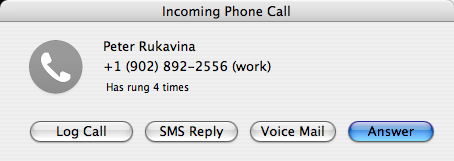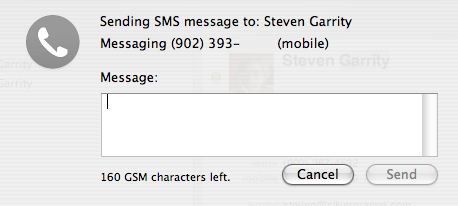I grabbed the audio of the interview about Plazes that aired this afternoon on CBC Radio’s Mainstreet this afternoon. It runs just over 10 minutes. Thanks to Angela Walker for a good interview and producer and technician Eva O’Hanley for running the board.
A friend of my was having a conversation with someone who was frustrated with the slow uptake of a new idea on Prince Edward Island. Her description of the conversation to me:
“And he thinks Islanders are resistant to new ideas. Maybe they’re just resistant to stupid ones.”
Okay, somehow in all my T610 fiddling, I missed the fact that Mac OS X has Bluetooth-enabled phone integration baked right in. I can set the iMac to display a pop-up when a new call comes in:

And I can send SMS messages directly from Address Book:

I stumbled across this trying to find a way of auto-syncing photos from phone to iMac.
Angela Walker and I taped an interview about Plazes this morning for Mainstreet. It will air this afternoon during the first half hour of the show (between 4:04 and 4:30 p.m. Atlantic Daylight Time). You can listen live from the CBC Prince Edward Island website; I’ll also endeavor to have an MP3 available after it airs.
I realize that I’m in no position to comment, but I can’t believe that there’s a television show that consists entirely of 60 live hours of watching Valerie Pringle take a train across Canada.
We’re promised “the romance, grandeur and rugged beauty of Canada.” What we get is endless hours of watching Valerie Pringle eating lunch. And Valerie Pringle talking about rivers. And train guys talking about how people with headphones walking down the tracks get wiped out by freight trains. And shots of railway track. And Valerie Pringle talking to waiters. And shots of railway track. And Valerie Pringle talking about what a great trip she’s having. All with a royalty free soundtrack of jazzy elevator music punctuated by the rail “air traffic control” radio chatter.
It is arguably the most boring 60 hours of television ever produced.
If you read the facsinating article in The New Yorker last week about Poppa Neutrino and his attempt to sail a “scrap raft” across the Pacific Ocean, you might want to check out floatingneutrinos.com, especially the FAQ page.
From the description of the Sony Clie VZ-90 available for sale in North America from Dynamism (emphasis mine):
Since the native OS is Japanese, it is very difficult for English users to navigate. Therefore, we DOT recommend it for anyone who is not Japanese-comfortable, or just incredibly brazen.
It’s almost enough to make me buy one.
Here’s the advertising policy for Mother Jones magazine; it doesn’t seem to be online, so I’ve scanned it and include it below. I was struck with how well-written and sensible it is.

 I am
I am